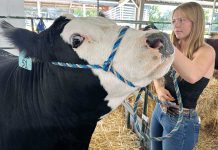
Volunteers bustled about in the Community Solutions warehouse in Gilroy on a recent morning, working behind the scenes to make the holidays memorable for South County families with children who have the least.
For the better part of four decades, the nonprofit—which provides a wide spectrum of services to families in need—has been fulfilling holiday wishes in one form or another. This year, the organization and its volunteers helped distribute gifts, ranging from new bicycles and DVD players to essentials like cleaning supplies and diapers, to more than 500 individuals across South County.
“The people we serve don’t have a lot, but with this program we’re reaching those who need the most help and have the least amount of options,” said Keri Gardner, communications manager for Community Solutions as volunteers helped distribute the wrapped gifts Dec. 11.
Through the program, every family member in a family with a child 12 and under gets to open multiple presents on Christmas morning. While the program has changed over time, the core of the matter—helping make the holiday season as cheerful as possible for those with the least to give to their families—has remained the same.
Even 32 years ago, when Community Solutions Chief Development Officer Lisa DeSilva first started at the nonprofit, the holiday giving program was a means to provide meals, including frozen turkeys, and gifts to its clients.
“We’d pile up things in the hallway or office—anywhere we could fit it,” DeSilva said. “Over the years, we had more and more donors who wanted to adopt full families. We’d put trees out with names and people would pick the names, but they wouldn’t necessarily be related necessarily. The whole concept came from our donors who said ‘we want to adopt full families.’”
When a donor adopts a family, they see what gifts the each family member—whose last name is kept confidential—has asked for.
“On their requests for the things they need, they get to put special needs they might have—it might say a heater, blankets, diapers or cleaning supplies—and then each person individually gets to define three things they need and three things they want,” explained Beth Edmonds, a Community Solutions volunteer and co-chaired the Holiday Giving Committee. “The donor will then choose—or do it all. Most of the time, they’ll get everything on the list.”
Most of the program’s growth and evolution can be attributed entirely to volunteers and donors who decide, year-after-year in many cases, to adopt a family. Before clients listed what they wanted for Christmas, DeSilva said some of the things they said they needed twisted her stomach into knots.
During the distribution, she told a story about one high school boy who—of all the things he wanted for Christmas—was a stick of deodorant and a new pair of socks. When donors learned that’s what clients said they wanted, they re-evaluated how to serve families in need.
“That’s why we changed it—because the donors said ‘of course we’ll buy those things but we want to buy them something special, too,” DeSilva said. “To this day, a lot of wishes that come in are things that, for most of us, would fall into the need category like cleaning supplies.”
One year, DeSilva said staff members were delivering presents to a family that included a 6-year-old girl and a 4-year-old boy. As staff were bringing the gifts inside and placing them under the Christmas tree, the little girl came bounding over. Her brother stopped her in her tracks, reeled her in and said, “No, those aren’t for us. We don’t have Christmas.”
“Before that, he never had a Christmas,” DeSilva said. “It happens so often.”
“The donors are so generous,” added volunteer Sherrie White, also co-chair of the Holiday Giving Committee. “They go above and beyond and it’s fabulous.”







